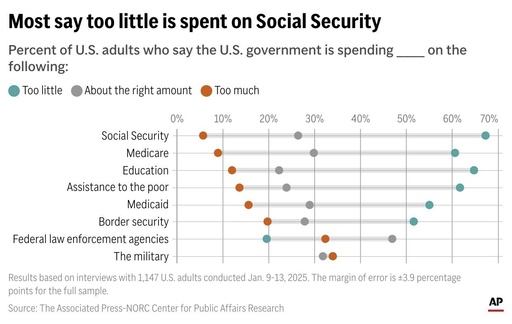WASHINGTON — The Republican Party is currently considering significant cuts to Medicaid, potentially endangering health care coverage for approximately 80 million individuals, both adults and children, who rely on this essential safety net program.
During the Biden administration, the expansion of Medicaid and the Affordable Care Act (ACA) marketplace was celebrated by Democrats as a triumph. However, with a focus on reducing federal spending and providing tax cuts primarily benefiting corporations and affluent individuals, Republicans view Medicaid as a prime candidate for reductions. The Medicaid program, which costs around $880 billion, is mainly funded by federal taxpayers, covering up to 80% of costs in several states. States are also experiencing financial challenges, managing years of program expansion alongside increasingly complex health needs among enrollees.
To address budget concerns, the GOP-controlled Congress is considering the implementation of work requirements for Medicaid recipients and potentially changing the reimbursement structure to a fixed, lower rate for states. Over the next ten years, Republican legislators might attempt to redirect billions from the health care services that aid the most economically disadvantaged citizens.
In the weeks leading up to these congressional debates, Republican governors from Arkansas, Ohio, and South Dakota have taken steps to introduce their own work mandates to Medicaid, likely to be endorsed by the Trump administration. There are indications that more budget cuts may follow. Just recently, a significant cut was announced, slashing the ACA’s navigator program budget by 90% to just $10 million. Navigators play a crucial role in assisting individuals with ACA and Medicaid applications, contributing to increased enrollment in these health care programs.
Proposals from Republican leaders include attaching work requirements to Medicaid, as suggested by House Speaker Mike Johnson from Louisiana. Johnson referred to this initiative as a logical approach, stating, “Little things like that make a big difference not only in the budgeting process but in the morale of the people. You know, work is good for you. You find dignity in work.” Nonetheless, research indicates that approximately 92% of current Medicaid recipients are already employed, studying, or serving as caregivers.
The proposed work requirement would mirror those established for the Supplemental Nutrition Assistance Program (SNAP), which mandates individuals aged 16 to 59 to either work or volunteer for at least 80 hours monthly, unless they fall into specific exemptions. Currently, the average monthly household income for those enrolled in SNAP is around $852, with benefits typically totaling $239.
During a GOP House retreat in Florida, Republicans expressed that the proposed requirements could incentivize employment opportunities, including jobs offering health insurance coverage. Representative Darrell Issa of California argued that budget cuts should not adversely affect the needy but rather target those improperly accessing benefits. He presented a hypothetical scenario of utilizing assistance while sidelined from contributing to society.
In addition to work requirements, there are proposals to shift federal reimbursements to a per-person limitation. This adjustment could impose a financial burden on states, forcing them to make difficult decisions regarding whom to cover, as noted by Joan Alker, the executive director of the Georgetown Center for Children and Families. Alker emphasized that healthcare needs persist, regardless of potential cuts to coverage.
Among the general public, more than half of U.S. adults believe that the government does not allocate enough resources toward Medicaid, with only 15% feeling it spends too generously.
Under Biden’s leadership, many states faced limitations on establishing their own work mandates and were required to eliminate such policies for Medicaid coverage. However, now that Trump has regained influence, Republican-led states are taking the initiative to pursue work requirements once again. Governors in Arkansas, Iowa, and Ohio are seeking approval from the federal Centers for Medicare and Medicaid Services to reintroduce these rules. Moreover, South Dakota voters have recently supported a plan to enforce work requirements.
In the past, Arkansas encountered challenges when implementing work mandates, resulting in around 18,000 individuals losing their Medicaid coverage. Legal challenges led to the halting of the requirement by a federal court and subsequent governmental changes under Biden. Several individuals struggled to navigate the state’s reporting systems, leading to coverage losses due to bureaucratic obstacles.
In Georgia, Paul Mikell, age 47, experiences firsthand the complexities of the enrollment process for the Pathways to Coverage plan, which extends Medicaid benefits to low-income individuals who exceed traditional Medicaid income limits. As Georgia has opted not to broaden Medicaid like many other states, individuals must engage in work, volunteering, or education for 80 hours monthly to access this expanded health coverage.
Mikell must travel 15 miles each month to report his hours, often encountering issues with the state’s online system that tracks these submissions. He describes his experience as a frustrating battle that he must endure, often relying on computers available at the library or borrowed devices.
In Idaho, where lawmakers are deliberating the introduction of a work mandate and a three-year cap on Medicaid benefits, family physician Peter Crane highlighted that a significant percentage of his patients benefit from the program. He emphasized that many are hardworking individuals employed in local industries who previously avoided seeking medical assistance due to financial constraints.
Democrats warn of potential repercussions for health care establishments, including rural hospitals and nursing facilities. Increased Medicaid enrollment has been crucial for hospitals, ensuring they receive compensation for patient care. “Hospitals will close, including in rural America and urban America and the heartland of America,” warned House Democratic leader Hakeem Jeffries during a recent speech, stressing that vulnerable populations, including children and the elderly, could be adversely affected by potential Medicaid cuts.




